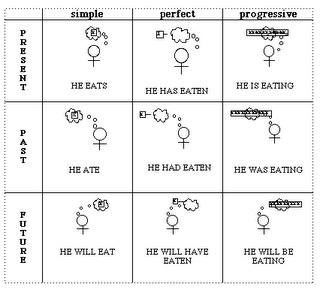What does it mean to be fluent in a language which is not your own? At what point does fluency become mastery of a language?
Interesting and though-provoking podcast from Kerstin's Fluent Blog.
 How is this for an innovation in learning pronunciation?
How is this for an innovation in learning pronunciation? Lots of great vocabulary tips here on Facebook at English Through Stories.
Lots of great vocabulary tips here on Facebook at English Through Stories.  If you want to check how to say a word in English, why not visit www.howjsay.com/? This is a free online dictionary - and it talks! (Note - if you use Firefox you can also get an add-on which allows you to access howjsay.com from your keyboard).
If you want to check how to say a word in English, why not visit www.howjsay.com/? This is a free online dictionary - and it talks! (Note - if you use Firefox you can also get an add-on which allows you to access howjsay.com from your keyboard).  Why not spend some time in the roots of English?
Why not spend some time in the roots of English? ds like:
ds like: The BBC's celebrated Learning English site has been redesigned. This site is excellent for improving your reading and listening skills and for learning new vocabulary.
The BBC's celebrated Learning English site has been redesigned. This site is excellent for improving your reading and listening skills and for learning new vocabulary. I have already mentioned the the Visual Thesaurus on the blog before. If you have not seen this amazing new concept for learning and exploring words - try it! You can also sign up for an email 'word a day'.
I have already mentioned the the Visual Thesaurus on the blog before. If you have not seen this amazing new concept for learning and exploring words - try it! You can also sign up for an email 'word a day'. A good and easy to use web site for testing and improving your knowledge of English grammar is English Grammar Secrets by Caroline and Pearson Brown.
A good and easy to use web site for testing and improving your knowledge of English grammar is English Grammar Secrets by Caroline and Pearson Brown. Word Clouds are a great new way to explore a language - and learn new vocabulary!
Word Clouds are a great new way to explore a language - and learn new vocabulary! The BBC Learning English web site (for several years now my favourite web site for English) has launched two new podcast services which could help your listening and speaking skills.
The BBC Learning English web site (for several years now my favourite web site for English) has launched two new podcast services which could help your listening and speaking skills.
 When do we use 'fewer than' and when do we use 'less than'?
When do we use 'fewer than' and when do we use 'less than'? One of the best ways to improve your English is to read and listen at the same time.
One of the best ways to improve your English is to read and listen at the same time. If you need to practise your English grammar, try the web site Grammar Quizzes run by teacher Julie Sevastopoulos in California.
If you need to practise your English grammar, try the web site Grammar Quizzes run by teacher Julie Sevastopoulos in California. As you have probably realised by now, English has a lot of phrasal verbs. That is, verbs which take a preposition (or an adverb) to create a new verb - a phrasal verb.
As you have probably realised by now, English has a lot of phrasal verbs. That is, verbs which take a preposition (or an adverb) to create a new verb - a phrasal verb. My top tip is the BBC Learning English site, especially the News English section. Here you will find articles every day with vocabulary highlighted. You can also listen to each story. Ideal for a coffee break or lunchtime!
My top tip is the BBC Learning English site, especially the News English section. Here you will find articles every day with vocabulary highlighted. You can also listen to each story. Ideal for a coffee break or lunchtime!  You might like to know that the web site for the United Nations Language Proficiency Exams has been redesigned. See here.
You might like to know that the web site for the United Nations Language Proficiency Exams has been redesigned. See here. What's the most common word in English?
What's the most common word in English?  Here are some random - but common - language issues:
Here are some random - but common - language issues: Improve your English vocabulary and give rice to the UN World Food Programme.
Improve your English vocabulary and give rice to the UN World Food Programme.  I have had a few questions recently about apostrophes in English.
I have had a few questions recently about apostrophes in English. The Hyphen: 'a small object of grammatical desire'......
The Hyphen: 'a small object of grammatical desire'...... Get Interested in Words and Collocations
Get Interested in Words and Collocations To get you thinking about collocation, you might like to spend some time at the amazing Visual Thesaurus. This is a great place for expanding your word power (but warning: it's a bit addictive!).
To get you thinking about collocation, you might like to spend some time at the amazing Visual Thesaurus. This is a great place for expanding your word power (but warning: it's a bit addictive!).




 Present Perfect Tense
Present Perfect Tense









